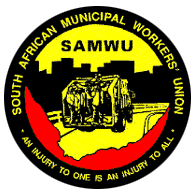Related Research Articles

The Congress of South African Trade Unions is a trade union federation in South Africa. It was founded in 1985 and is the largest of the country's three main trade union federations, with 21 affiliated trade unions.
Anarchism in South Africa dates to the 1880s, and played a major role in the labour and socialist movements from the turn of the twentieth century through to the 1920s. The early South African anarchist movement was strongly syndicalist. The ascendance of Marxism–Leninism following the Russian Revolution, along with state repression, resulted in most of the movement going over to the Comintern line, with the remainder consigned to irrelevance. There were slight traces of anarchist or revolutionary syndicalist influence in some of the independent left-wing groups which resisted the apartheid government from the 1970s onward, but anarchism and revolutionary syndicalism as a distinct movement only began re-emerging in South Africa in the early 1990s. It remains a minority current in South African politics.

The South African Municipal Workers Union (SAMWU) is the largest union in local government in South Africa.

The Independent Municipal & Allied Trade Union (IMATU) is a trade union in South Africa. It has a membership of 107,000 and is the largest politically independent trade union in the local government sector.

The environmental movement in South Africa traces its history from the beginnings of conservation and preservation groups in the late 19th century, to the rise of radicalism amongst local ecologists and activists. The early environmental movement in South Africa was primarily made up of conservation groups whose membership was dominated by affluent whites. Many of these groups advocated for forms of fortress conservation that were used to justify forcibly removing Black South Africans from their land. Throughout the mid to late 20th century, justice-centered environmental groups sprung up in connection with anti-apartheid movements advocating for change on issues that affected the environment as well as the rights of workers and rural peoples, showing how environmental issues in the country were "inextricably linked to issues of race and politics."
The Industrial and Commercial Workers' Union (ICU) was a trade union and mass-based popular political movement in southern Africa. It was influenced by the syndicalist politics of the Industrial Workers of the World, as well as by Garveyism, Christianity, communism, and liberalism.
The following is a timeline of the history of the city of Johannesburg, in the Gauteng province in South Africa.

The Industrial Workers of the World (South Africa) or IWW (SA) had a brief but notable history in the 1910s-20s, and is particularly noted for its influence on the syndicalist movement in southern Africa through its promotion of the IWW's principles of industrial unionism, solidarity, and direct action, as well as its role in the creation of organizations such as the Industrial Workers of Africa and the Industrial and Commercial Workers' Union.
The following is a timeline of the history of the city of Durban in the eThekwini Metropolitan Municipality, KwaZulu-Natal province, South Africa.
The Workers' Library and Museum was a non-profit labour service organisation (LSO) active in Johannesburg, South Africa between 1987 and the early 2000s. The organisation provided a meeting and learning centre for labour activists as well as students from the nearby Alexandra and Soweto areas. In 1994, it was expanded into the Workers and Museum in Newtown, Johannesburg, with the only museum in South Africa focussed on working people other than the Slave Lodge, Cape Town.
The Municipal Workers' Union of South Africa (MWUSA) was a trade union representing local government workers in South Africa.
The Post and Telecommunication Workers' Association (POTWA) was a trade union representing workers in the communications industry in South Africa.
The General Workers' Union of South Africa (GWUSA) was a general union in South Africa.
The South African Association of Municipal Employees (SAAME) was a trade union representing local government workers in South Africa.
The Amalgamated Union of Building Trade Workers of South Africa (AUBTWSA) is a trade union representing workers in the construction industry in South Africa.
The Sweet Workers' Union (SWU) was a small but long-lived union representing confectionery workers in South Africa.
The Suid-Afrikaanse Onderwysers Unie (SAOU), sometimes translated as the South African Teachers' Union, is a trade union representing principally Afrikaans-speaking teachers in South Africa.
The Democratic Municipal and Allied Workers' Union of South Africa (DEMAWUSA) is a trade union representing workers employed by local authorities and state governments in South Africa.
Archibald Crawford was a Scottish-born South African trade union leader.
Moegammad Saliegh Manie is a retired South African politician and former trade unionist. He rose to political prominence during the 1980s as a leading figure in the Cape Town Municipal Workers' Association and South African Municipal Workers' Union. Later he represented the African National Congress (ANC) in the National Assembly from 1994 until his resignation in 2007.
References
- 1 2 Catchpowle, Lesley (2002). A Case Study of the South African Municipal Workers' Union (SAMWU) in the Western Cape (1992-1997) (PDF). Greenwich: University of Greenwich. Retrieved 18 March 2021.
- ↑ Barchiesi, Franco (Spring 2007). "Privatization and the Historical Trajectory of "Social Movement Unionism": A Case Study of Municipal Workers in Johannesburg, South Africa". International Labor and Working-Class History. 71: 50–69. doi:10.1017/S0147547907000336.
- ↑ "COSATU turns 20!". NUMSA. 29 November 2005. Retrieved 13 March 2021.
- ↑ Musi, Mojalefa (2010). Evaluating IMATU and SAMWU policy responses to Igoli 2002. Johannesburg: University of the Witwatersrand.